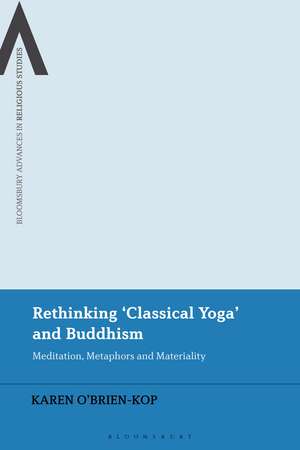Rethinking 'Classical Yoga' and Buddhism: Meditation, Metaphors and Materiality: Bloomsbury Advances in Religious Studies
Autor Karen O'Brien-Kopen Limba Engleză Paperback – 19 apr 2023
| Toate formatele și edițiile | Preț | Express |
|---|---|---|
| Paperback (1) | 192.48 lei 6-8 săpt. | |
| Bloomsbury Publishing – 19 apr 2023 | 192.48 lei 6-8 săpt. | |
| Hardback (1) | 570.02 lei 6-8 săpt. | +121.81 lei 6-12 zile |
| Bloomsbury Publishing – 6 oct 2021 | 570.02 lei 6-8 săpt. | +121.81 lei 6-12 zile |
Din seria Bloomsbury Advances in Religious Studies
- 24%
 Preț: 196.71 lei
Preț: 196.71 lei - 23%
 Preț: 191.22 lei
Preț: 191.22 lei - 23%
 Preț: 192.10 lei
Preț: 192.10 lei - 13%
 Preț: 256.20 lei
Preț: 256.20 lei - 13%
 Preț: 256.59 lei
Preț: 256.59 lei - 13%
 Preț: 257.97 lei
Preț: 257.97 lei - 13%
 Preț: 237.57 lei
Preț: 237.57 lei - 13%
 Preț: 237.28 lei
Preț: 237.28 lei -
 Preț: 256.59 lei
Preț: 256.59 lei - 13%
 Preț: 257.68 lei
Preț: 257.68 lei - 13%
 Preț: 258.77 lei
Preț: 258.77 lei - 23%
 Preț: 198.30 lei
Preț: 198.30 lei - 23%
 Preț: 198.47 lei
Preț: 198.47 lei - 23%
 Preț: 191.67 lei
Preț: 191.67 lei - 23%
 Preț: 196.96 lei
Preț: 196.96 lei - 24%
 Preț: 196.71 lei
Preț: 196.71 lei - 23%
 Preț: 192.19 lei
Preț: 192.19 lei - 23%
 Preț: 192.36 lei
Preț: 192.36 lei - 23%
 Preț: 191.38 lei
Preț: 191.38 lei - 23%
 Preț: 192.73 lei
Preț: 192.73 lei - 23%
 Preț: 191.92 lei
Preț: 191.92 lei
Preț: 192.48 lei
Nou
Puncte Express: 289
Preț estimativ în valută:
36.83€ • 38.53$ • 30.60£
36.83€ • 38.53$ • 30.60£
Carte tipărită la comandă
Livrare economică 03-17 aprilie
Preluare comenzi: 021 569.72.76
Specificații
ISBN-13: 9781350230033
ISBN-10: 1350230030
Pagini: 280
Ilustrații: 10 bw illus
Dimensiuni: 156 x 234 x 25 mm
Greutate: 0.4 kg
Editura: Bloomsbury Publishing
Colecția Bloomsbury Academic
Seria Bloomsbury Advances in Religious Studies
Locul publicării:London, United Kingdom
ISBN-10: 1350230030
Pagini: 280
Ilustrații: 10 bw illus
Dimensiuni: 156 x 234 x 25 mm
Greutate: 0.4 kg
Editura: Bloomsbury Publishing
Colecția Bloomsbury Academic
Seria Bloomsbury Advances in Religious Studies
Locul publicării:London, United Kingdom
Caracteristici
Decentres the Eurocentric and imperialist enterprises of the 19th century and reframes the cultural period of the 1st - 5th centuries CE using categorical markers from Indic intellectual history.
Notă biografică
Karen O'Brien-Kop is Lecturer in Asian Religions and Ethics at the University of Roehampton, UK.
Cuprins
List of Tables Preface Acknowledgements AbbreviationsIntroduction: Classical Yoga and Buddhism: Debates, Dialogue and Intertextuality1. Moksa, Metaphors, and Materiality: Concepts and Contexts of 'Liberation'2. Seeds of Bondage and Freedom: Eliminating the Afflictions (Klesas) in the Patanjalayogasastra and the Abhidharmakosabhaya3. The 'Other' Yoga sastra: The Yogacarabhumisastra4: Patanjala Yoga and Yogacara: the Cultivation of the Counterstate5. Who Put the Classical in Classical Yoga? The Inadequacy of an Analytic Category 6: Conclusion: Rethinking Classical Yoga: A Categorical Paradigm Shift?Appendices Bibliography Index
Recenzii
Rethinking 'Classical Yoga' and Buddhism offers a new and valuable discussion of the early history of yoga. It brings a careful assessment of metaphor theory into the discussion of early Indian soteriology, and explores the intertwined nature of Indian religious practices that we too easily divide off as "Hindu" and "Buddhist". A wonderful contribution to our understanding of Indian religion, literature and history.
This book is ground-breaking, not only in its recognition and analysis of the Buddhist backdrop to Patanjali's Yoga tradition, but also in the application of cognitive metaphor theory to the study of Indian philosophical texts. In overcoming reified and anachronistic notions of "Hindu" and "Buddhist" in the study of contemplative traditions of ancient India, this work is to be highly recommended to anyone wishing to understand the broader intellectual and yogic context out of which Patanjali's Yoga Sutras emerged.
The author blends a keen historical sensitivity with intertextual analysis and the conceptual metaphor theory (CMT) of Lakoff and Johnson. ... The book makes important contributions to our understanding of the shared religiocultural environment that nourished the early discourse of yoga and the "conceptual sharing" between groups whose intellectual identity did not easily map onto any facile religious identity.
This book is ground-breaking, not only in its recognition and analysis of the Buddhist backdrop to Patanjali's Yoga tradition, but also in the application of cognitive metaphor theory to the study of Indian philosophical texts. In overcoming reified and anachronistic notions of "Hindu" and "Buddhist" in the study of contemplative traditions of ancient India, this work is to be highly recommended to anyone wishing to understand the broader intellectual and yogic context out of which Patanjali's Yoga Sutras emerged.
The author blends a keen historical sensitivity with intertextual analysis and the conceptual metaphor theory (CMT) of Lakoff and Johnson. ... The book makes important contributions to our understanding of the shared religiocultural environment that nourished the early discourse of yoga and the "conceptual sharing" between groups whose intellectual identity did not easily map onto any facile religious identity.
